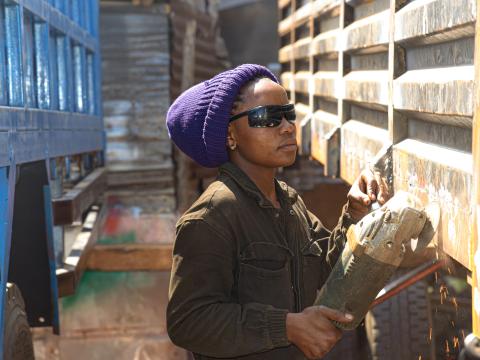DR Congo: Christelle breaks gender stereotypes and transforms her life thanks to support from World Vision

By Rodrigue Harakandi, Communications Officer
"Hello, my name is Christelle, I'm 18 years old, and I'm a welder and fitter. I specialise in making vehicle bodies, reinforcing chassis, and other accessories." So begins the inspiring story of Christelle, a young girl who, thanks to the RESILIENCE project implemented by World Vision and funded by Unicef, broke down gender stereotypes to make her way in a traditionally male field.
The RESILIENCE project has been a force for change in the lives of Christelle and many other young people. 683 girls and 518 boys from the health zones of Nyiragongo, Rwanguba, Walikale, and Itebero in the province of North Kivu in the east of the Democratic Republic of Congo have benefited from a vocational training programme. These include car mechanics, carpentry, masonry, hairdressing, beauty care, culinary arts, fitting, welding, animal husbandry, electricity, and cutting and sewing.
Christelle, with her iron will, chose welding and fitting. "I wanted to show my female colleagues that there was no such thing as an exclusively male profession," she says with conviction.
This determination has enabled Christelle to find a place for herself in this profession and improve her family's life and become a role model for her community. "I buy food at home and help my younger brothers and sisters with some of their needs," she says.
The impact of the RESILIENCE project is not limited to the acquisition of professional skills. It also gives participants like Christelle a sense of belonging and recognition within their work communities. "What I like most about my job is the respect I now have within the team," explains Christelle. She recounts how, despite working in a predominantly male team, she is treated fairly and given complex tasks, thus improving her abilities.
For Christelle, the programme is not an end in itself. She sees a future where she can mentor other girls, just as World Vision has done for her. "My dream is to grow in this profession and become a team leader one day so that I can mentor other girls in the same way that World Vision supported my training," she says.
By breaking down gender barriers and offering vocational training opportunities, the RESILIENCE project has enabled young people like Christelle to transform their lives and realise their dreams. This is eloquent proof of the positive impact that such programmes can have on young people's lives, their autonomy and their future.
"The RESILIENCE project is a ray of light in the darkness, a testament to the human capacity to rise in the face of adversity.It proves that even in conflict zones, hope and transformation are possible. It reminds us that every young person, whatever their background, has the potential to grow, to learn and to make a positive contribution to their community. And like Christelle, they have the power to show that there is no profession reserved only for men and that everyone has the right to choose their path, regardless of gender stereotypes", says Jacques Birindwa, Resilience Project Manager.